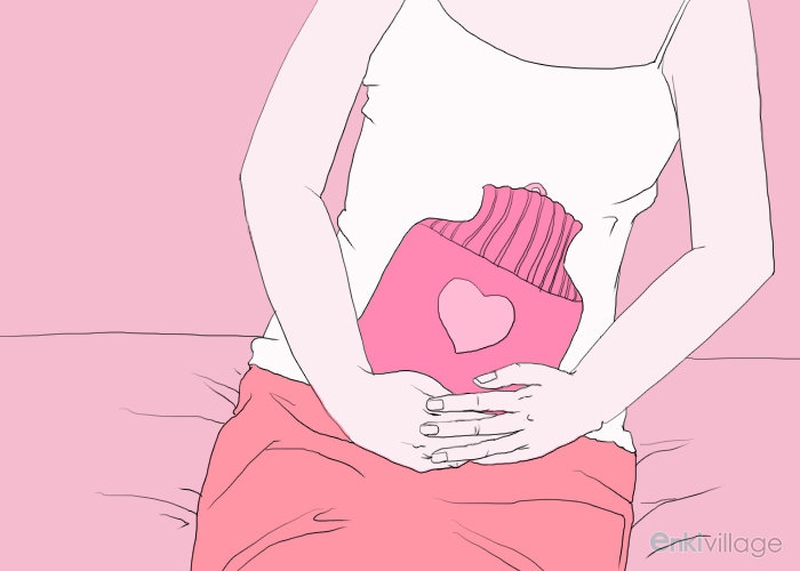For women of a reproductive age, it is a good idea to pay attention to their menstrual period as well as any changes in it for that these can indicate an underlying medical condition. Despite this, remember that menstruation varies between woman to woman so you should only be alarmed if you notice a sudden change in an abnormal pattern.
Although women mostly pay attention to how frequent their menstrual periods are, they should also note the color and thickness of their blood. For example, if you haven't experienced bright red period blood before, it may be concerning.
Bright Red Period Blood – Is It Normal?
It is more common to have light red period blood during the first day of a menstrual cycle. After this, the color will become darker as the blood cells "aged" more within the uterus. Some women may normally experience bright red period blood, while other women typically have dark period blood, and are concerned about the changes.
If you did not previously have period blood that was bright red or it just happened one month, you should explore the causes. There are many possible explanations and some are minor while others are serious.
Hormone imbalance. A woman's menstrual cycle is linked strongly to her body's hormones so if there is any hormonal imbalance (which is common), there may be changes in a woman's menstrual pattern. Menopause can be difficult as there are many changes in the hormones, leading to changes throughout the body, such as abnormal periods. Hormone levels can also be affected by lifestyle, diet, and stress, some of which may also lead to changes in menstruation, such as bright red blood. Before you panic, take the time to consider any recent changes to your lifestyle.
Possible miscarriage. Most women who suddenly experience bright red period blood will automatically think they had a miscarriage. That may be the case, particularly when joined by severe cramps and in many cases a woman won't have known she was pregnant if she miscarries early. As the uterus attempts to expel anything in it, light red period blood and cramps might happen. If your color hasn't changed in two days, the blood flow is abnormally high, and the cramps are constant, you should visit your gynecologist. Miscarriages can lead to complications that you want to avoid whenever possible.
Ovarian cyst. It is also possible that period blood will be bright red if an ovarian cyst ruptured. The general rule is that you should visit the doctor in the case of bright red blood during your period if it occurs suddenly and you also have other concerning symptoms.
Other Common Period Blood Colors
Dark Period Blood
If blood during your period is dark, it is usually older. This age refers to the amount of time the blood was stored within the uterus. Older blood will have had more time in which to break down and it may have had air exposure or started coagulating within the vaginal canal. It is common to notice this darker red blood first thing in the morning.
Black or Brown Period Blood
You may be asking yourself "why is my period blood brown?" and this is a good question. It simply means that this is the oldest blood. It is usually light and either part of light spotting near the beginning of the period or near the end of it. In the case of infrequent periods, it may simply have been the first blood to enter and otherwise, it may have been stuck in uterine wall folds. In some cases, you will see brown blood during very light bleeding as it takes a while to leave the uterus. It is also common for period blood clots to seem darker in color.
Orange Period Blood
In some cases, bright red blood from your period will mix together with cervical fluid, creating an orange appearance with red flecks. Other times, bright orange blood will indicate infection. As such, if it occurs frequently or doesn't seem slippery, you should visit your doctor.
How to Have a Healthy Period
Use a Heating Pad for Cramps
Heating pads are great at getting rid of cramps. Place the heating pad on your lower stomach and let it stay there.
Keep Supplies on Hand
No matter where you are, ensure you have pads, tampons, and/or panty liners with you. Try keeping them in your school bag, purse, bra, or even shoe. You should also consider putting a few in your gym locker to help out in case an emergency happens.
Avoid Junk Food, Excessive Salt, and Sugar
If you eat foods with a lot of salt or sugar or consume too much junk food during your period, it may make your cramps worse. You should also try to avoid chocolate or dairy as all of these foods are at risk in making horrible cramps.
Wear Comfortable Clothes
You will probably be very uncomfortable during your period if you wear tight jeans or a tight shirt. Instead, opt for sweatpants and comfortable shirt. Try to keep a jacket on hand if you are worried about leaks as you can wrap it along your waist to cover them. Or you can bring an extra pair of pants with you.
Nutrition and Hydration
Nutrition is crucial for hormonal balance and a healthy menstrual cycle. Make sure you get a variety of vitamins, minerals, antioxidants, and essential fatty acids. Vitamin D, omega 3 fatty acids, B12, vitamin A, beta carotene, and iron all play key roles in hormonal balance. Add some cinnamon to your food as it will help with mood swings, breast pain, and cramps.
It is also important to drink plenty of water to keep your flow healthy. Try having a quart in the morning and another during the rest of the day. If you add another quart of fresh juices, you will be great.







View All Comments /Add Comment